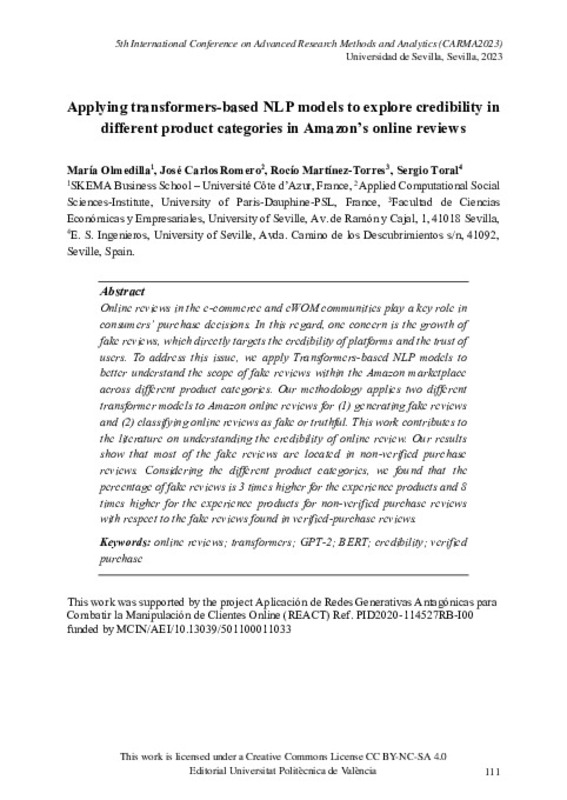JavaScript is disabled for your browser. Some features of this site may not work without it.
Buscar en RiuNet
Listar
Mi cuenta
Estadísticas
Ayuda RiuNet
Admin. UPV
Applying Transformers-based NLP Models to Explore Credibility in Different Product Categories in Amazon’s online reviews
Mostrar el registro sencillo del ítem
Ficheros en el ítem
| dc.contributor.author | Olmedilla, María
|
es_ES |
| dc.contributor.author | Romero, José Carlos
|
es_ES |
| dc.contributor.author | Martínez-Torres, Rocío
|
es_ES |
| dc.contributor.author | Toral, Sergio
|
es_ES |
| dc.date.accessioned | 2024-01-10T13:10:44Z | |
| dc.date.available | 2024-01-10T13:10:44Z | |
| dc.date.issued | 2023-09-22 | |
| dc.identifier.isbn | 9788413960869 | |
| dc.identifier.uri | http://hdl.handle.net/10251/201708 | |
| dc.description.abstract | [EN] Online reviews in the e-commerce and eWOM communities play a key role in consumers’ purchase decisions. In this regard, one concern is the growth of fake reviews, which directly targets the credibility of platforms and the trust of users. To address this issue, we apply Transformers-based NLP models to better understand the scope of fake reviews within the Amazon marketplace across different product categories. Our methodology applies two different transformer models to Amazon online reviews for (1) generating fake reviews and (2) classifying online reviews as fake or truthful. This work contributes to the literature on understanding the credibility of online review. Our results show that most of the fake reviews are located in non-verified purchase reviews. Considering the different product categories, we found that the percentage of fake reviews is 3 times higher for the experience products and 8 times higher for the experience products for non-verified purchase reviews with respect to the fake reviews found in verified-purchase reviews. | es_ES |
| dc.description.sponsorship | This work was supported by the project Aplicación de Redes Generativas Antagónicas para Combatir la Manipulación de Clientes Online (REACT) Ref. PID2020-114527RB-I00 funded by MCIN/AEI/10.13039/501100011033 | es_ES |
| dc.language | Inglés | es_ES |
| dc.publisher | Editorial Universitat Politècnica de València | es_ES |
| dc.relation.ispartof | 5th International Conference on Advanced Research Methods and Analytics (CARMA 2023) | |
| dc.rights | Reconocimiento - No comercial - Compartir igual (by-nc-sa) | es_ES |
| dc.subject | Online reviews | es_ES |
| dc.subject | Transformers | es_ES |
| dc.subject | GPT-2 | es_ES |
| dc.subject | BERT | es_ES |
| dc.subject | Credibility | es_ES |
| dc.subject | Verified purchase | es_ES |
| dc.title | Applying Transformers-based NLP Models to Explore Credibility in Different Product Categories in Amazon’s online reviews | es_ES |
| dc.type | Capítulo de libro | es_ES |
| dc.type | Comunicación en congreso | es_ES |
| dc.relation.projectID | info:eu-repo/grantAgreement/AEI/Plan Estatal de Investigación Científica y Técnica y de Innovación 2017-2020/PID2020-114527RB-I00/ES/APLICACION DE REDES GENERATIVAS ANTAGONICAS PARA COMBATIR LA MANIPULACION DE CLIENTES ONLINE (REACT)/ | es_ES |
| dc.rights.accessRights | Abierto | es_ES |
| dc.description.bibliographicCitation | Olmedilla, M.; Romero, JC.; Martínez-Torres, R.; Toral, S. (2023). Applying Transformers-based NLP Models to Explore Credibility in Different Product Categories in Amazon’s online reviews. Editorial Universitat Politècnica de València. 111-112. http://hdl.handle.net/10251/201708 | es_ES |
| dc.description.accrualMethod | OCS | es_ES |
| dc.relation.conferencename | CARMA 2023 - 5th International Conference on Advanced Research Methods and Analytics | es_ES |
| dc.relation.conferencedate | Junio 28-30, 2023 | es_ES |
| dc.relation.conferenceplace | Sevilla, España | es_ES |
| dc.relation.publisherversion | http://ocs.editorial.upv.es/index.php/CARMA/CARMA2023/paper/view/16453 | es_ES |
| dc.description.upvformatpinicio | 111 | es_ES |
| dc.description.upvformatpfin | 112 | es_ES |
| dc.type.version | info:eu-repo/semantics/publishedVersion | es_ES |
| dc.relation.pasarela | OCS\16453 | es_ES |
| dc.contributor.funder | Agencia Estatal de Investigación | es_ES |






